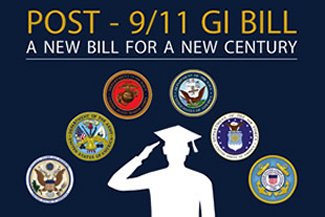Education & Employment
GI Bill®
The GI Bill® is the federal government’s primary educational program for Veterans. Two versions are available:
Post-9/11 GI Bill®
The Post-9/11 GI Bill® is for individuals with at least 90 days of aggregate service on or after September 11, 2001, or individuals discharged with a service-connected disability after 30 days. You must have received an honorable discharge to be eligible for the Post-9/11 GI Bill®. The Post-9/11 GI Bill® became effective for training on August 1, 2009. In addition to traditional degree-granting programs, the Post-9/11 GI Bill® was expanded on October 1, 2011 to include on-the-job training, non-college degrees, flight training, apprenticeships, and correspondence courses. Generally, benefits are payable for 15 years following your release from active duty.
The Forever GI Bill (effective January 1, 2015) removes benefit expiration dates also known as the use-it-or-lose-it rule. Previously, veterans had 15 years after they were discharged to the use the money. Unfortunately this will not apply to all veterans as the cost to do so was too costly. Veterans whose last discharge or release from active duty is on or after January 1, 2013, will not expire. Those that were discharged or released before January 1, 2013 will still expire. Also, any service member who receives a Purple Heart, regardless of how long they have served, will be eligible for full GI Bill benefits. Previously, Purple Heart recipients had to serve for at least 3 years.
More Information: USDVA Education and Training: Post 9-11 GI Bill

MGIB Program
The MGIB program, also known as Ch.30 or Ch.1606, provides up to 36 months of education benefits. You must have received an honorable discharge to be eligible. This benefit may be used for degree and certificate programs, flight training, apprenticeship/on-the-job training, and correspondence courses. Remedial, deficiency, and refresher courses may be approved under certain circumstances. Generally, benefits are payable for 10 years following your release from active duty.
More Information: USDVA Education and Training: Montgomery Bill
Survivors and Dependents Assistance
There are two main GI Bill programs offering education assistance to survivors and dependents of Veterans:
The Marine Gunnery Sergeant John David Fry Scholarship (Fry Scholarship)
 The Marine Gunnery Sergeant John David Fry Scholarship (Fry Scholarship) provides Post-9/11 GI Bill benefits to the children and surviving spouses of Service members who died in the line of duty while on active duty during or on September 11, 2001. Eligible beneficiaries attending school may receive up to 36 months of benefits at the 100% level.
The Marine Gunnery Sergeant John David Fry Scholarship (Fry Scholarship) provides Post-9/11 GI Bill benefits to the children and surviving spouses of Service members who died in the line of duty while on active duty during or on September 11, 2001. Eligible beneficiaries attending school may receive up to 36 months of benefits at the 100% level.
Children are eligible as of their 18th birthday (unless they have already graduated high school). A child may be married or over 23 and still be eligible, although their eligibility ends on their 33rd birthday. A spouse will lose eligibility to this benefit upon remarriage. A spouse has 15 years from the date of death of the Servicemember to use the benefit.
More Information
• Fry Scholarship Main Page (USDVA Website)
• Fry Scholarship Payment Rates
Dependents Education Assistance Program
This program offers education and training opportunities to eligible dependents of Veterans who are permanently and totally disabled due to a service-related condition or of Veterans who died while on active duty or as a result of a service-related condition. Benefits may be used for degree and certificate programs, apprenticeship, and on-the-job training. If you are a spouse, you may take a correspondence course. Remedial, deficiency, and refresher courses may be approved under certain circumstances.
You may receive up to 45 months of education benefits. Effective Oct. 1, 2013, some DEA beneficiaries may be eligible for up to 81 months of GI Bill benefits if they use the Survivors and Dependents Educational Assistance program in conjunction with an entitlement from other VA education programs
Vocational Rehabilitation and Employment

You may receive Vocational Rehabilitation and Employment (VR&E) services to help with job training, employment accommodations, resume development, and job seeking skills coaching.
Other services may be provided to assist Veterans in starting their own businesses or independent living services for those who are severely disabled and unable to work in traditional employment. The Vocational Rehabilitation and Employment (VR&E) program has two key goals. First, to assist the service-disabled veteran to prepare for, obtain, and maintain suitable employment. Second, for those persons who are severely disabled and that gainful employment is not an option, assistance may be provided to allow that person to live more independently in his or her community.
Note: To obtain information about Vocational Rehabilitiation and Employement services, please go to the VR&E section of the U.S. Department of Veterans Affairs Website.
Eligibility for VR&E Services

Veterans are eligible if they:
- Have received a discharge that is other than dishonorable
- Have a service-connected disability rating of at least 10% from VA
- Apply for VR&E services
Basic Period of Eligibility
The basic period of eligibility ends 12 years from the date of notification of one of the following: Date of separation from active military service, or Date the veteran was first notified by VA of a service-connected disability rating. This period of eligibility may be extended if a Vocational Rehabilitation Counselor (VRC) determines that a Veteran has a Serious Employment Handicap.
